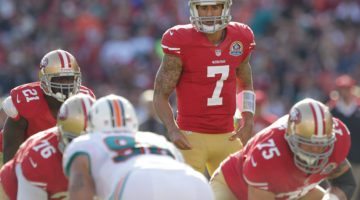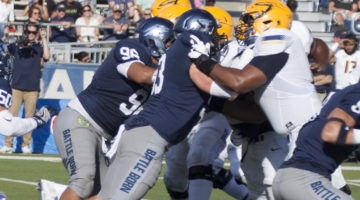
Photo courtesy of Breanna Denney/Nevada Sagebrush. Photo illustration by Andrea Wilkinson/Nevada Sagebrush
Editor’s note: Neil is the sports editor of the Nevada Sagebrush. His opinion is his own and does not reflect the views of the Nevada Sagebrush or its staff.
By Neil Patrick Healy
This 2016 presidential election has been a combination of a “Family Guy” episode and the opening scene from an apocalypse movie. It’s been god awful, and there’s a giant, five-letter, orange reason for this spray-tanned dumpster fire — Trump. I hear all the reasons for why Donald Trump shouldn’t be president. Everything from the blatant racism, misogyny, pussy-grabbing, Trump University, demeaning POWs and the weird obsession he has with his daughter. To all of that, I always have the same response.
“And he killed the USFL.”
Whenever I say this people usually just laugh at the absurdity of my reasoning for not voting for Trump (spoilers, duh), but I think there is a wealth of knowledge from Trump’s escapade in the 1980s upstart football league.
For those of you like me who weren’t even born when this was a thing, the USFL was a professional football league formed in 1982 by New Orleans businessman David Dixon to try and capitalize on America’s rising interest in football. The league’s business plan, called “The Dixon Plan,” was to play its games in the spring so not to compete with the NFL or college football directly in the fall. It also wanted to play its games in NFL-caliber stadiums, have a territorial draft so teams have college players that people in their respective markets are familiar with and to have a rigid salary cap so teams don’t get into bidding wars. The league was offering a different kind of product than its more established rival.
While the NFL was fining its players for celebrating too much (sound familiar?) and earning the nickname of “The No Fun League,” the USFL became known for its antics and fun environment. Teams like the Tampa Bay Bandits (who were co-owned by actor Burt Reynolds) had famous, extravagant promotions such as seven-car giveaways and mortgage burnings. The USFL introduced the two-point conversion and replay challenges to professional football, which are now staples to the NFL today.
The league was also a quality product in terms of performance. Of the 1,536 players who played in the league, 778 of them had played or would go on to play in the NFL. The list of NFL players include Hall of Famers Jim Kelly, Steve Young, Reggie White and Gary Zimmerman along with former Heisman Trophy winners Herschel Walker, Doug Flutie and Mike Rozier.
The USFL’s first season in 1983 looked to be a relative success. The goal of having an average attendance of 25,000 per game was reached and the projected TV rating exceeded the 5.0 rating the owners wanted and was at 6.1. ABC and the upstart ESPN were broadcasting games. If the league had just stayed the course, it may have been a successful minor league, but then Trump happened.
Trump acquired the New Jersey Generals in 1984 as the league expanded from 12 teams to 18 so that the owners could secure franchise fees and cut some losses, and he began to make a media circus out of it. Trump came in, as Trump always does, as the self-proclaimed savior while pouring in tons of money and grabbing headlines in the process. He spent big money to acquire players from the NFL and lure in college stars. He even came close to signing defensive end Lawrence Taylor away from the New York Giants, but the deal fell through once the Giants nearly doubled his salary. The Generals jumped from 6-12 to 14-4 in Trump’s first year as owner, but it was his moves off the field that made the league tank.
In 1985, the owners, led by Trump, decided to move the season from the spring to the fall in order to compete directly with the NFL. Canadian businessman and co-owner of the Bandits John Bassett pushed back against this idea for years, but his health began to worsen when it was discovered he had two brain tumors.
With Bassett out of the way, Trump was free to take control of the league. His plan was to force a merger and basically get an NFL team for almost nothing. The first step was to file an antitrust lawsuit against the NFL, citing the NFL had broken anti-monopoly laws. The jury did rule in the USFL’s favor, but it was only awarded $1. Antitrust laws triple the payouts, so the USFL was granted a whopping total of $3. The court ruling was catastrophic for the league and was the end of the USFL.
Thanks to the owners being greedy and expanding to 18 teams and Trump trying to bully his way to owning an NFL franchise, the USFL failed to last. Trump moved on to his failed casinos in Atlantic City while the rest of his partners were forced to pick up the pieces. Are we seeing any correlation between this and the election cycle or the rest of his business ventures?
The plan was never to merge with the NFL. The plan was to have a different league play in a different time of year and carve out a different niche, which was the fun league in the spring that was a little weird and wacky. Trump never wanted anything to do with that, saying, “If god wanted football to be played in the spring, he wouldn’t have invented baseball.” The common response to that is why did he get involved at all? Because he saw it as the best way to get in the NFL. He blew up the rules and the Dixon Plan to better himself, even if it hurt the rest of the league. Blowing up the salary cap and getting into bidding wars with the NFL while trying to compete with them directly spelled disaster.
You can even compare the league expanding to the GOP having 17 candidates in the beginning of the election process — all that expansion and chaos leading to the rise of Trump. He used it to his advantage to get what he wanted, and when he didn’t he left and kept doing it up until now. You can compare his ambition to compete with the NFL to his ambition with a lot of his failed businesses and how he isn’t a good businessman at all.
“You can cut and paste the USFL and the GOP, and it’s the same damn story,” said former radio announcer for the Generals and Dodgers Charley Steiner in an interview with Esquire. “It’s all about him and the brand and moving on to the next thing if it doesn’t work out.”
Hindsight may be 20/20, but it’s clear the USFL didn’t get a chance to fail on its own. It failed because of Trump putting his interests before the interests of the league, and that’s the message people need to think about before voting. Does Trump really care about making America great again, or does he care about making The Donald great?
Neil Patrick Healy can be reached at neil@sagebrush.unr.edu and on Twitter @NP_Healy.











